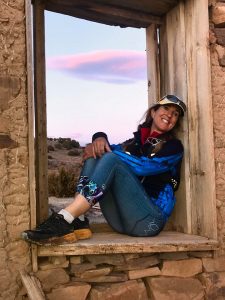
Katrin Silva is also an accomplished ultrarunner
Editor’s Note: Best Horse Practices Summit presenter Katrin Silva grew up riding dressage in Germany before moving to the United States at age 19 to learn to ride Western. She’s been riding both disciplines for the last 20 years and is a regular guest columnist for Cayuse Communications. The author of Dressage for All of Us: How to Help Any Horse Become a Happier, More Responsive Riding Partner lives in New Mexico where she works with dressage and Western clients. Visit her blog here.
Silva writes:
Last summer, I entered a couple of horses in a good-sized dressage competition. My first class of the day was on a sensitive and inexperienced young mare. As we practiced transitions and circles in the warmup arena, I glanced at the other riders. They seemed so much more accomplished, so much better prepared than I felt. From the arena fence, a few trainers coached their students. I recognized one of them as a USDF gold medalist, another as an accomplished clinician and FEI-level competitor.
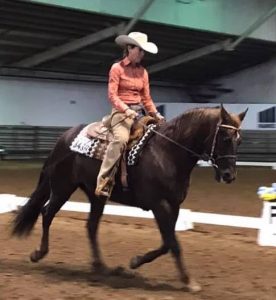 Neither the riders nor their coaches were there to look at me. I knew that, but nonetheless I imagined cold, critical eyes. My confidence wavered. My horse’s confidence, predictably, did the same thing. My anxiety about not being good enough kept me from listening to my horse. I began to ride like a mechanical wind-up toy, preoccupied with what I looked like, instead of feeling and breathing. Our ride was not as fluid as it could have been and our score reflected it. Luckily, I remembered how to breathe and focus before our next class.
Neither the riders nor their coaches were there to look at me. I knew that, but nonetheless I imagined cold, critical eyes. My confidence wavered. My horse’s confidence, predictably, did the same thing. My anxiety about not being good enough kept me from listening to my horse. I began to ride like a mechanical wind-up toy, preoccupied with what I looked like, instead of feeling and breathing. Our ride was not as fluid as it could have been and our score reflected it. Luckily, I remembered how to breathe and focus before our next class.
It’s difficult to ride well when someone you perceive as judgmental is watching you work your horse. Years ago, in an effort to learn as much as possible, I rode in every dressage clinic I could afford. A few times, the clinician’s comments were so scathing that I slunk away, feeling like I would never learn to do anything correctly.
I’ve since learned to spend money on instructors who offer constructive, more positive feedback. But I still sometimes find myself riding in front of people who may not like the way I sit on a horse. Anxiety creeps in and negatively impacts the ride.
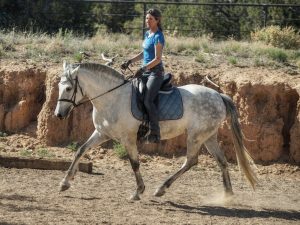 Yet when friends or clients are watching, I have to be careful to not show off the horse just to impress my audience. I don’t want to sacrifice real thoroughness and connection for the fleeting pleasure of a stroked ego.
Yet when friends or clients are watching, I have to be careful to not show off the horse just to impress my audience. I don’t want to sacrifice real thoroughness and connection for the fleeting pleasure of a stroked ego.
So is it best to avoid the watchful eyes altogether and only ride when alone?
No, definitely not. We can’t avoid riding in front of an audience if we want to become better riders. Lessons, clinics, competitions, and group rides are opportunities to connect with like-minded people and learn new skills. And for many of us, we may become sloppy and complacent when riding alone. We ride egg-shaped circles and squiggly straight lines. We repeat our favorite patterns and exercises, regardless of whether the horse we’re riding needs them. When we ride alone, we tend to stay in our comfort zone, which often becomes smaller and smaller over time.
So, how can we learn to ride our best, more consistently, in more situations, regardless of who is or isn’t watching? It’s useful to pay attention to how audiences influence us, to harness the positive effects while minimizing the negative ones.
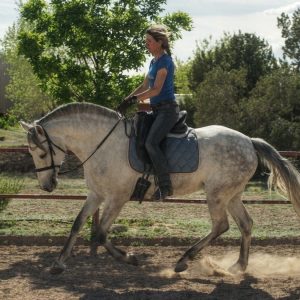 Here’s my trick:
Here’s my trick:
- Ride like no one is watching when someone is.
- Ride like someone is watching when no one is.
Try to see competitive settings as an opportunity for growth, not as a particularly painful form of self-punishment. Dealing with the discomfort of real or imagined pressure is a skill we can develop over time, with the help of good friends and maybe a few sessions with a sport psychologist. I should know. I used to suffer from anxiety attacks at clinics and competitions. I also used to beat myself up for having these anxiety attacks, which made them worse.
Now, I try to treat myself like I would treat a horse with similar issues: with kindness and calm reassurance. I also use visualization. When someone – anyone – is watching, I imagine a huge, bouncy soap bubble. The horse and I are moving inside this translucent space, shielded from negativity and my own ego alike. We are listening to each other. The watchful eyes are out there, but they can’t come in unless I let them.
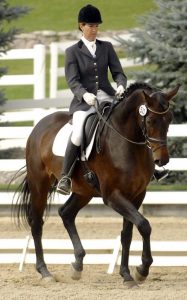 When no one is watching me work my horses, I often pretend someone is watching. Not just anyone, but someone knowledgeable, constructive, supportive, and kind. Someone who is not easily impressed, but not hypercritical, either. I usually picture one of my revered mentors, casually leaning on the arena fence, or riding alongside me, glancing over every once in a while, offering encouragement or gentle corrections. My imaginary audience helps me to:
When no one is watching me work my horses, I often pretend someone is watching. Not just anyone, but someone knowledgeable, constructive, supportive, and kind. Someone who is not easily impressed, but not hypercritical, either. I usually picture one of my revered mentors, casually leaning on the arena fence, or riding alongside me, glancing over every once in a while, offering encouragement or gentle corrections. My imaginary audience helps me to:
- Sit up straighter on my horse.
- Keep me on the edge of my comfort zone and ready to expand it.
- Ride with focus and intention, choosing exercises that help each horse become a happier athlete.
- Keep paying attention to how the horse feels and adjust my expectations accordingly.
- Ride my best.
When do you ride your best? With no one watching, with someone watching? I would love to know.
Yep. This is a dance for sure. The one thing I try to stay focused on in either scenario, is being at one with my horse. That, as a meditation helps me in competition, and is simply a joy on the trail.
Beautifully expressed, Katrin. After 20 years honing my skills as an observer, I’m cultivating my riding skills at long last at an advanced age…via a cadre of talented instructors. Wow. Am in awe of you and others who are so excellent compared to the fumbling unconfident me atop the incredibly patient steeds who carry me during this process. Can’t even begin to add the pressure of competition to the mix. Good riding is HARD to do!
Kerry, I do the same thing. Riding, at its best, is a form of meditation: a way of being in the present moment, synchronized with another being, both of us breathing as one. That said, the little gremlins called Anxiety, Ego, and Rumination tend to sit on my shoulders, from where they whisper distracting comments into my ears. I listen to them less than I used to, but it’s a work inprogress.
Letitia, we are all in the same boat, learning how to be better riders. Professional trainers are not any “better” than anyone else, just more experienced. Good luck on your journey
I love reading these comments. Thanks, Katrin and Kerry, for the enlightenment and for broadening the scope of the conversation!
Maddy, thank you for giving us an inviting platform to have this conversation on.
I don’t compete and probably never will however the points you make about feelings during competitions are insightful and inspiring to anyone, novice or above. Thanks for the lovely imagery and perspective. It is always good to hear from an experienced, skilled rider/trainer who clearly values the qualities that matter whether being judged in our riding or being our own judges.